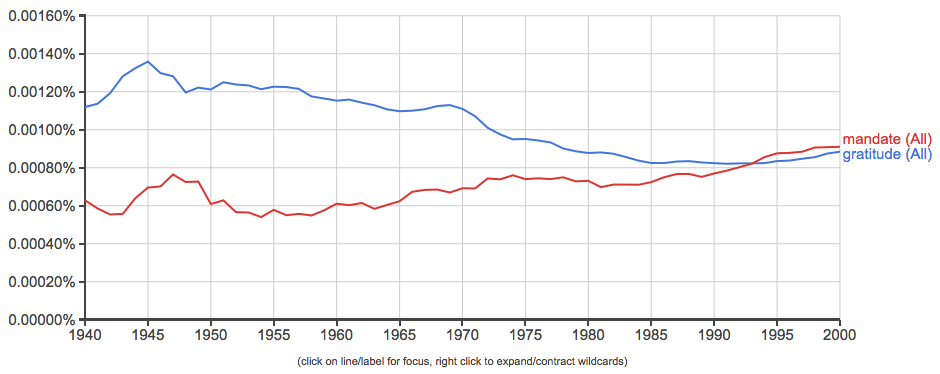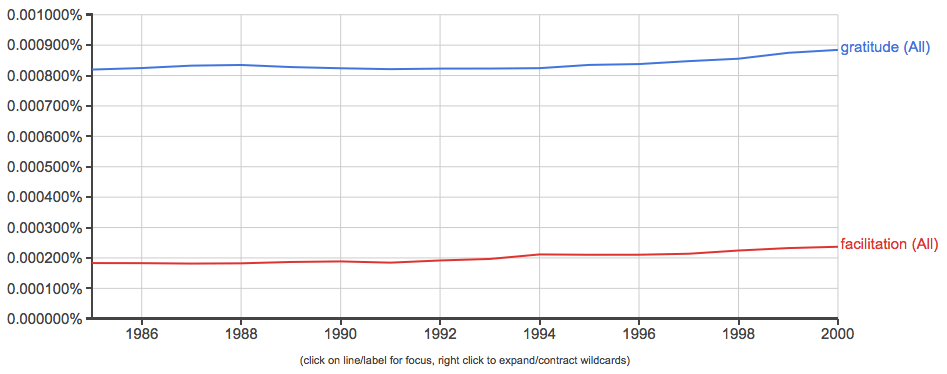The evidence is overwhelming—those who have more gratitude, or an attitude of gratitude — are happier individuals.
Although you won’t hear the term ‘happy’ very frequently in one of our meetings or workshops (because the word is both subjective and fuzzy), it seemed appropriate as people of the United States are celebrating their Thanksgiving period to provide a quick reflection.
Few, if any, would argue that gratitude is not a positive attitude. Positive attitudes, or an attitude of gratitude, provide a leading indication for the opportunity to galvanize consensus. Therefore, groups who have more gratitude are more likely to agree.
Mandate vs. Gratitude
Of interest are the following trend lines extracted from Google’s Ngram. As the use of the term ‘mandate’ has increased in recent decades, the use of the term ‘gratitude’ has decreased. While the relationship does not prove that people have less gratitude today than in the past, it does suggest that the frequency of the term and reference to its positive meaning has been on the decline.
Facilitation vs. Gratitude
Although use of the ‘facilitation’ in a business sense is relatively new (over the past few decades), since we started teaching facilitation there has been a steady and positive slope increase in the use of gratitude. Not coincidentally, we would argue.
Implications?
Get your group to be more thankful for what they have, rather than dwelling on what they do not have. Use what they have (e.g., skills, strengths, etc.) to focus on WHAT they could do to further extend what gives them gratitude.
You will benefit personally as well. Harvard Medical School reports that “In positive psychology research, gratitude is strongly and consistently associated with greater happiness. Gratitude helps people feel more positive emotions, relish good experiences, improve their health, deal with adversity, and build strong relationships.” (emphasis is ours)
People in the United States take so much for granted, it can make outsiders incredulous. Perhaps less than one percent of the people on this planet have some money in the bank, a few coins in their purse, a stocked refrigerator at home, the ability to read, at least one parent who remains alive, the skill to read, and the liberty to attend the place of worship at their choosing.
If you do, if your meeting participants do, then we suggest that you begin your meeting or workshop by first stressing the gratitude to have the opportunity to make things better for your business and its stakeholders. Most people are not so fortunate.
______
Don’t ruin your career by hosting bad meetings. Sign up for a workshop or send this to someone who should. MGRUSH workshops focus on meeting design and practice. Each person practices tools, methods, and activities every day during the week. Therefore, while some call this immersion, we call it the road to building high-value facilitation skills.
Our workshops also provide a superb way to earn up to 40 SEUs from the Scrum Alliance, 40 CDUs from IIBA, 40 Continuous Learning Points (CLPs) based on Federal Acquisition Certification Continuous Professional Learning Requirements using Training and Education activities, 40 Professional Development Units (PDUs) from SAVE International, as well as 4.0 CEUs for other professions. (See workshop and Reference Manual descriptions for details.)
Want a free 10-minute break timer? Sign up for our once-monthly newsletter HERE and receive a timer along with four other of our favorite facilitation tools, free.

Terrence Metz, president of MG RUSH Facilitation Training, was just 22-years-old and working as a Sales Engineer at Honeywell when he recognized a widespread problem—most meetings were ineffective and poorly led, wasting both time and company resources. However, he also observed meetings that worked. What set them apart? A well-prepared leader who structured the session to ensure participants contributed meaningfully and achieved clear outcomes.
Throughout his career, Metz, who earned an MBA from Kellogg (Northwestern University) experienced and also trained in various facilitation techniques. In 2004, he purchased MG RUSH where he shifted his focus toward improving established meeting designs and building a curriculum that would teach others how to lead, facilitate, and structure meetings that drive results. His expertise in training world-class facilitators led to the 2020 publication of Meetings That Get Results: A Guide to Building Better Meetings, a comprehensive resource on effectively building consensus.
Grounded in the principle that “nobody is smarter than everybody,” the book details the why, what, and how of building consensus when making decisions, planning, and solving problems. Along with a Participant’s Guide and supplemental workshops, it supports learning from foundational awareness to professional certification.
Metz’s first book, Change or Die: A Business Process Improvement Manual, tackled the challenges of process optimization. His upcoming book, Catalyst: Facilitating Innovation, focuses on meetings and workshops that don’t simply end when time runs out but conclude with actionable next steps and clear assignments—ensuring progress beyond discussions and ideas.





